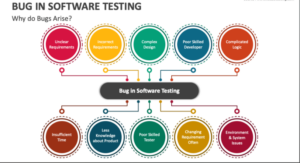Introduction
Does QA Require Coding? Quality Analysis involves evaluating the functionality and totality of the software test. As a QA tester, most professionals agree that your primary job is to test the software product after the completion of the development phase. This is true, but a good question is, do you need coding skills to perform your job effectively?
Most people also agree that you do not necessarily need coding to perform your primary job as a QA tester. Some QA tester courses might also tell you that. This might be accurate but it is very advisable that you learn how to code.
If you want to be recognized as a good QA tester, you must possess these two features: a good knowledge of coding skills depending on the type of testing you are involved with, and good logical thinking skills. The IT world is constantly evolving, especially with the introduction of Agile methodology, and so a QA tester must evolve with it. Having the ability to create SQL queries and conduct automation testing makes you effectively evaluate an app or a website more accurately.
When dealing with Manual testing, you might not need coding but you must have a level of coding skills if you want to go into Automated testing. This is because automation testing requires concepts like code coverage, statement coverage, and cyclomatic complexity, amongst others. These concepts need a good knowledge of coding skills and databases.
So, it is concluded that if you want to be outstanding as a QA tester, then it is vital that you learn the skills of coding. Let’s see the advantages of learning coding and how it will make you a better professional in QA.
Does QA Require Coding for Manual Testing?
As mentioned, manual testing generally does not require coding skills. Manual testers are responsible for executing tests without writing code. They focus on finding defects through human interaction with the software, validating functionality, and providing feedback.
Some tasks in manual testing might involve using tools to track bugs, manage test cases, or automate simple testing processes, but these tools do not necessarily require programming knowledge. For example, tools like Jira, TestRail, or Bugzilla help in managing the testing process without the need for coding.
However, having basic knowledge of coding can still be beneficial for manual testers. Understanding the developer’s perspective and being able to communicate effectively with developers can improve collaboration. It can also help testers to identify issues more efficiently and understand the software’s architecture.
The Role of Coding in Automated Testing
In contrast to manual testing, Automated testing does require coding skills. Automated testers are responsible for writing, maintaining, and executing test scripts that validate various parts of the software.
Coding is required in automated testing for several reasons:
- Writing Test Scripts: Automated testers use programming languages and testing frameworks to write scripts that test various aspects of the software. Without coding skills, testers cannot create the scripts needed to run automated tests.
- Scripting Test Scenarios: Automated testing involves simulating user interactions with the application. Testers need to write scripts that mimic clicks, form submissions, navigation, and other actions. Without coding skills, testers would not be able to implement these scenarios.
- Handling Complex Test Cases: Some test cases, such as performance testing or load testing, require custom scripts to simulate heavy loads or complex interactions. These tests require a deep understanding of the system and how to create scripts that accurately measure performance.
- Working with Testing Frameworks: Automated testers often work with testing frameworks like Selenium, JUnit, and TestNG. These frameworks use code to create automated test cases and execute them across different browsers, devices, and environments.
Without coding skills, testers would not be able to use these frameworks effectively.
How to Acquire Coding Skills for QA Roles
While not all QA roles require coding, it’s becoming increasingly valuable to possess basic programming knowledge. Many QA testers are learning to code to expand their skillset and improve their career prospects. Here are some steps to acquire coding skills for QA roles:
- Start with the Basics: Learn a programming language that’s commonly used in software testing, such as Python, Java, or JavaScript. There are many online resources, tutorials, and courses that can help beginners get started with coding.
- Learn Testing Frameworks: Once you’ve grasped basic programming concepts, focus on learning popular testing frameworks like Selenium for web application testing or Appium for mobile testing. These frameworks are widely used in automated testing.
- Take Online Courses: Enroll in a Software Testing Course that includes automated testing or QA Tester Training that covers both manual and automated testing.
- Practice Coding: Like any skill, coding requires regular practice. Work on small projects, write test scripts for different applications, and try to automate as much as possible. The more you practice, the more comfortable you will become with coding.
Is Coding Necessary for Every QA Role?
Not all QA roles require coding skills. The necessity of coding in Quality Assurance (QA) depends largely on the type of testing being performed. QA roles can broadly be divided into manual testing and automated testing, with each having distinct skill requirements. Let’s explore the different aspects of QA and when coding skills are essential.
Manual Testing: No Coding Required
Manual testing is one of the most common roles in QA, where testers check the software manually without using automation tools or writing code. The primary responsibility is to validate the software’s functionality by following predefined test cases and identifying bugs or issues from a user’s perspective.
- Does Manual Testing Require Coding? No, manual testers do not need coding skills to perform their jobs effectively. Instead, they need to be familiar with testing methodologies, attention to detail, and the ability to identify software defects based on user behavior.
Automated Testing: Coding is Essential
Automated testing, on the other hand, involves using code to write test scripts and validate software functionality. It is designed to test software repeatedly and consistently, making it ideal for regression testing, large-scale applications, or repetitive tasks that would be time-consuming for manual testers.
- Does Automated Testing Require Coding? Yes, automated testing requires coding knowledge. Testers need to understand programming languages such as Java, Python, JavaScript, or Ruby to write test scripts and implement them using automation tools like Selenium, Cucumber, or JUnit.
Performance Testing: Coding for Load and Stress Tests
Performance testing focuses on assessing how well a software application performs under various levels of stress or load. This includes tasks like load testing, stress testing, and scalability testing. To simulate large numbers of users or heavy traffic, performance testers use scripts to create the necessary environment.
- Does Performance Testing Require Coding? Yes, performance testing often requires coding, especially when writing custom scripts to simulate user activity or stress on the system. Familiarity with programming languages like Python, Java, or Gatling is required to generate these performance tests.
Security Testing: Coding for Vulnerability Assessment
Security testing ensures that the software is free from vulnerabilities and protects user data. Penetration testers, for example, need coding skills to test the security features of applications by attempting to exploit weaknesses.
- Does Security Testing Require Coding? Yes, security testing, particularly penetration testing, requires knowledge of coding. Security testers need to understand the underlying software architecture and write scripts that can simulate cyber-attacks or identify vulnerabilities in the codebase.
However, understanding the basics of programming can still provide an advantage in any QA role. A good understanding of coding concepts enables testers to communicate more effectively with developers and better understand the technical aspects of the software they are testing.
Why Should You Learn Coding?
1. Improve your knowledge of Software.
Knowing how to code as a QA tester will provide you with some knowledge regarding how software is built and how it is run by a computer. You will also understand how data is characterised and stored; about concepts like decision points, flow controls, branches, and loops. These concepts will help you know how errors can be put into a system. QA helps you learn how software systems should work, but with coding skills, you will gain insights into how these systems may not work.
2. It expands your technical experience.
As a QA tester, one of your major tasks is to write test scenarios, and then automate and execute them. A good question to ask is where the ideas come from when writing test scenarios. Part of it comes from the empirical way, that is the knowledge and experience of the QA specialist, but part of It also comes from a logical way, through testing techniques. Learning to code expands your technical experience enabling you to gain more insights and ideas for recognizing what to test.
You will also be able to better discern what is going wrong in the application, making it easier for you to describe bugs and replicate them if need be.
3. It helps you to work effectively with software developers.
Knowing how to code as a Quality Analyst makes it easier to know the complicatedness of software development but at the same time, it also helps you to find bugs, identify risks, and locate problems in the code. If there is any bug, you can work with the development team to fix them.
Most importantly, you will be able to speak the developer’s language and contribute to technical discussions.
4. It improves process performance.
Coding skills in QA boost the process performance of a software system. As a QA, coding helps you in automating test cases, thereby shortening the response time required to verify if the system is with the anticipated quality level. This is one major parameter software companies use to select Quality Analysts.
5. It allows you to make queries.
With coding, you will be able to create queries in the databases. This is useful in checking your test execution results.
If you are into manual testing, scripting languages like JavaScript are good to learn as they will boost your testing skills. But if you want to go into professional automation testing, then you can start your coding skills with languages like Java or VBScript. Also, understanding DBMS and SQL concepts is a good practice for you.
Conclusion
In Conclusion, Coding is required for all quality analysts and it can be learned through Quality assurance course online. This is somewhat true, and coding skills can help Quality Analysts to develop clever automated tests that can run many permutations of data entry and links. This can be used to locate problems that can be fixed by the developers.
Call to action
Ready to boost your career in Quality Assurance?
Explore H2K Infosys for comprehensive QA software testing courses that teach both manual and automated testing, as well as coding skills for automated test scripts. Start your journey to becoming a well-rounded QA professional today!


































2 Responses